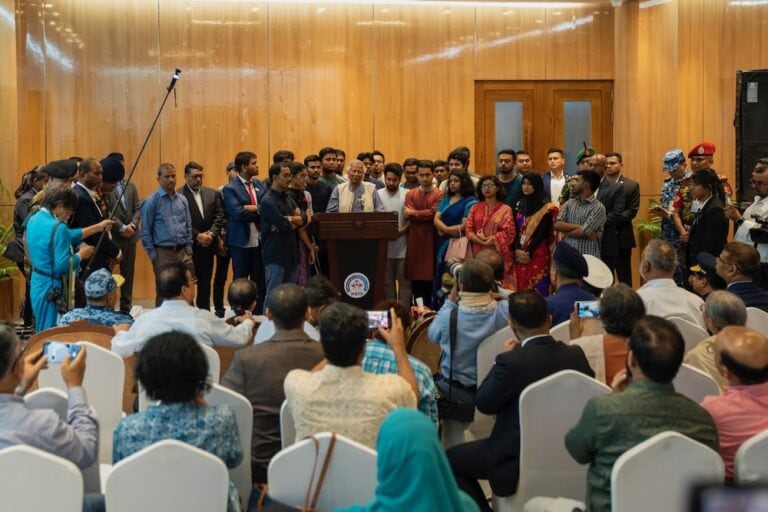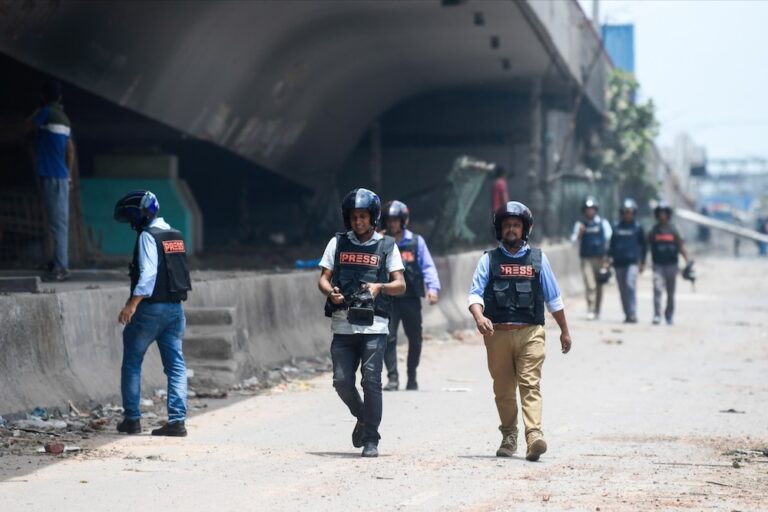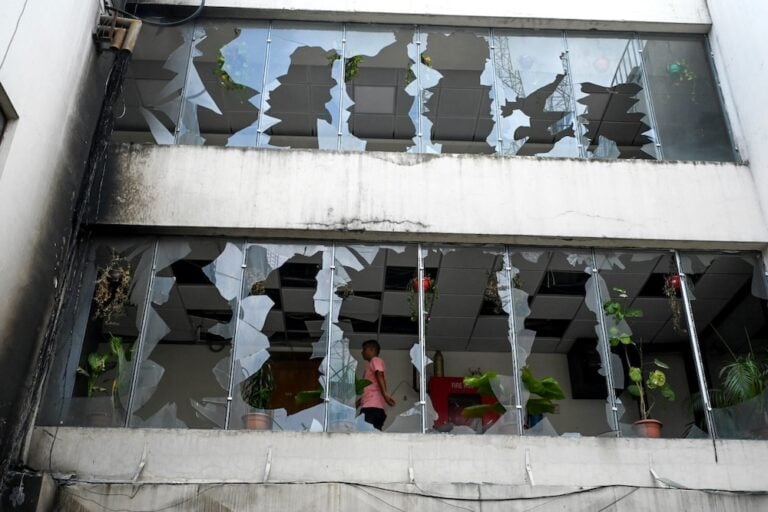(Media Watch/IFEX) – Once again in Bangladesh, newspaper offices and journalists have become the target of political activists. Leading opposition parties (Bangladesh Nationalist Party, BNP, Jatyo Party, JP, Jamat-e-Islami and Islami Okkyo Jote) called a three day national general strike from 9 to 11 February 1999. During this strike period, two newspaper offices were attacked, […]
(Media Watch/IFEX) – Once again in Bangladesh, newspaper offices and
journalists have become the target of political activists. Leading
opposition parties (Bangladesh Nationalist Party, BNP, Jatyo Party, JP,
Jamat-e-Islami and Islami Okkyo Jote) called a three day national
general strike from 9 to 11 February 1999. During this strike period,
two newspaper offices were attacked, four vehicles carrying journalists
were burned, four photojournalists were assaulted (one of whom was shot
and injured), and five other journalists were stopped from performing
their professional duties.
On 9 February, the first day of the strike, at about 11 a.m. (local
time), a group of strike supporters attacked the “Daily Star” newspaper
office in the Dhanmondi area of the capital city, Dhaka. They tried to
enter the office but failed because security men prevented them. The
group threw stones, seized a rickshaw from the premises, and set fire to
it. The “Daily Star” is one of the country’s renowned and credible
English language dailies.
On the same afternoon, in the Bijoynagar area in the heart of Dhaka,
when strike supporters tried to set fire to a rickshaw, a
photojournalist of the “Bhorer Kagoj” newspaper, Masud Parvez Anis,
tried to take a picture of the event. Suddenly the activists attacked
Anis, who was shot, received a bullet injury to his back, and was
admitted to hospital.
On the same day, in Rangamati, one of the district towns in the
Chittagong Hilltract area, five journalists were assaulted by activists
belonging to the strike supporter opposition parties. In the Jettighat
area, Sakhawat Hosain Rubel of the “Purbokne” newspaper, Shamsul Alam
of “Ajker Kagoj” newspaper, Ahmed Nabi of the “Dinkal” newspaper, Oli
Ahmed of “Banglabazar Patrika” newspaper and Supryo Chakma of “Rupali”
newspaper, were assaulted by strike supporters. They were not allowed
to cover the news of the strike. In reaction to this, local journalists
immediately took the decision to boycott news of the oppositon parties
until they apologised for their supporters’ actions.
On the third day of the strike, 11 February, three photojournalists
became the target of anti-strike activists, apparently the ruling party
workers and police. At about 2 p.m., in the Jatrabari area of the
capital, three photojournalists, Sohrab Alam of the “Sangbad” newspaper,
Shamsuddin Ahmed Charu of “Ittefaq” newspaper, and Abu Taher Khokan of
the “Financial Express” newspaper tried to cover the police action
against strike supporters. Police first tried to prevent them from
taking pictures. When this failed, police sought the help of ruling
party supporters. This group attacked the photojournalists and tried to
steal their cameras. They assaulted the photojournalist while police
stood by.
That same evening, a leader of the opposition Jamat-e-Isalmi, a
fundamentalist Islamic group, claimed that police and ruling party
activists attacked the office of the “Sangram” daily in the Maghbazar
area of the capital Dhaka. “Sangram” is officially branded as supporting
Islamic fundamentalists.
Recommended Action
Send appeals to authorities:
smoothly
Appeals To
Prime Minister Sheikh Hasina Wazed
Prime Minister`s Office
Old Airport Rd, Tejgaon
Dhaka, Dhaka Division
Bangladesh
Fax: +880 2 813 244 / 811 015 / 813 243Mr.Rafiqul Islam Biruttam
Minister of Home Affairs
Fax: +880 2 883 144Begum Khaleda Zia
Leader of the Oppossiton and Chairperson of BNP
Fax: +880 2 836 687
Please copy appeals to the source if possible.


